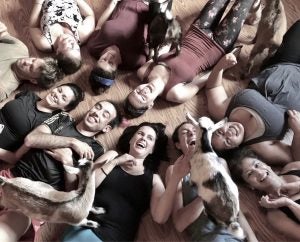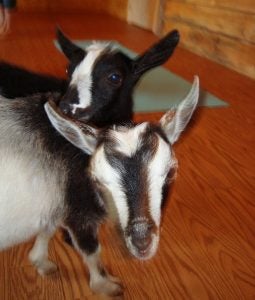Peter Corriveau has owned his goat farm since 2001, and friends, family members and farm fans love to send him funny goat videos.
Early last year, he received a clip of goat yoga. The animals roam around participants as they hold their poses. A farmer in Oregon was the first, as far as anyone knows, to host yoga with goats.
Corriveau liked the idea. He found no one else in New England offering goat yoga in April 2017, when he launched classes at Jenness Farm in Nottingham, New Hampshire. A video of one of the earliest groups went viral, and a waiting list for Jenness classes grew to 300 people at one point.
“Everyone loves baby goats,” says Corriveau, who sells soaps, lotions and other products made from goat’s milk at his farm shop. “Most of it isn’t even about doing yoga. It’s about the goats, because you can do yoga anywhere.”
For farms like Jenness, goat yoga is a boon for business, a way to attract visitors who otherwise might not come to the farm. “It’s brought more people — I mean local people who didn’t even know we were here,” Corriveau says.
Jenness yoga participants have traveled from New York and the Canadian border in Maine. A couple from Maryland flew up (one of them worked for the airline), for an overnight just to practice poses with the goats, Corriveau says.
“It’s really fun to watch everybody, because they just smile and laugh,” says Janine Bibeau the local yoga instructor who leads the Jenness classes.
The goats seem to like it, too. They nibble at participants’ hair and toes and jump on their backs and over their heads, kicking up their heels as they frolic across the yoga mats.
In late spring, Corriveau corralled four baby Nigerian Dwarf goats in a playpen in the middle of the Jenness shop, in a rambling clapboard building and barn on a quiet winding road. A bit of a distraction while he tried to work, the 4-week-old Dwarfs would join four older kids in class that evening. The milking goats at Jenness are a bit larger with better production, Corriveau says, but he keeps the Dwarfs to milk and breed for future goat yoga classes.

Jenness classes cost $35. Yoga participants get a 15 percent discount at the farm store that evening.
“Our original intention was just to do Thursday night and one Sunday a month,” Corriveau says. He quickly added a second, then a third weekly class, and finally went to six days a week.
“We still couldn’t keep up with demand,” Corriveau says. “The phone was ringing off the hook.”
Numbers have since dropped a bit, but weekend classes still fill up. The first groups met inside the shop until Corriveau cleared an upstairs storage space for a larger studio that can fit as many as 22 participants. He caps most classes at 16 for comfort.

Other farms with goat yoga — there are many across the country — hold classes outside, but Corriveau dismissed that. “What if it’s raining? What if it’s hot and muggy? It would be a miserable experience.”
If the goats poop or pee or otherwise make trouble during class, a Jenness staffer is on hand to clean up. “There’s accidents in class,” Corriveau shrugs. “If people can’t handle that, they shouldn’t be here.”



